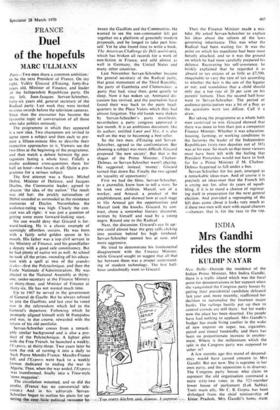INDIA
Mrs Gandhi rides the storm
KULDIP NAYAR
New Delhi—Outside the residence of the Indian Prime Minister, Mrs Indira Gandhi, there is a traffic island which was the focal point for demonstrations in her support when she vanquished the Congress party bosses by getting their presidential candidate defeated last year and, more recently, reaffirmed her decision to nationalise the fourteen major hanks. The railings hastily put up then to control crowds are still there: but for weeks now the place has been deserted. The people have had nothing to applaud. Mrs Gandhi's budget has made living costlier in the wake of new imposts on sugar, tea, cigarettes, petrol and tinned foodstuffs; and there has been no proportionate increase in employ- ment. Where is the millennium which the split in the Congress party was supposed to usher in?
A few months ago this mood of despond-
ency would have caused concern to Mrs Gandhi. But not now. She is supreme in her own party, and the opposition is in disarray. The Congress party bosses who claim to represent the old organisation command a mere sixty-two. votes in the 523-member lower house of parliament (Lok Sabha). Their main ally, Mr. C. B. Gupta, has been
dislodged from the chief ministership of Pradesh. Mrs Gandbi's home. state;
their two other pillars, the chief ministers of Mysore and Gujarat, are tottering.
The leftist parties also seem to have lost their moorings. They are quoting Mrs Gandhi more than Karl Marx. The national- , isation of the banks took the wind out of their sails. The Communists (forty-three members of the Lok Sabha) are divided into left and right, and the two wings are busy trying to destroy each other. The rightist, pro-Russian faction has openly aligned itself with Mrs Gandhi, and with her help it ousted the leftist, pro-China faction from the government of Kerala, the southernmost state of India. Mrs Gandhi has also been busy in West Bengal, where the left-wing Communists have been distributing private land, occupying houses and shops, stopping work in factories and even murdering political opponents in the countryside, with the police under the charge of Mr Jyoti Basu, the leftists' own nominee in the pro- vincial government, reduced to helplessness: she hopes that West Bengal will soon have a government minus the Marxists.
The two other social democratic parties— the Praja Socialists and the Samukut Social- ists—are still trying to adjust emotion to the new situation. Their heart is with Mrs Gandhi but their head with the opposition. They hope to enjoy influence behind the scenes without attracting the odium of asso- ciating themselves with the ruling party. Furthermore they are divided in their atti- tude to the Prime Minister and finding it uncommonly hard to live together.
The Swatantra party and the Jana Sangh, the two rightist parties, are experiencing difficulties in enforcing discipline upon their militants at state level, who want to share power wherever possible. For example, the Congress party bosses still have their govern- ment in Gujarat intact: so the Swatantra group is joining hands with Mrs Gandhi's group in an attempt to topple it. In Punjab, the Jana Sangh supports a coalition govern- ment with the Sikh Akali party, and makes every effort to keep the other opposition groups out. Thus the central officers of both the Swatantra party and the Jana Sangh are quite helpless.
This disruption in the ranks of opposition parties works entirely to Mrs Gandhi's ad- vantage. She was expecting a hard time during the budget session, because she does not have an absolute majority in the 'lower house. But the inability of the others to unite has made her secure. Again, when the supreme court ruled that the nationalisation of the banks was unconstitutional, this was widely regarded as a severe jolt for her. But she had another ordinance promulgated to sustain nationalisation, and introduced fresh legislation to cover up the legal deficiencies that the supreme court had pointed out.
The reaffirmation of the decision to nationalise the banks has not revived the euphoria of popular support which it evoked when first announced six months ago. But
then euphoria cannot even last for long. Mrs Gandhi's advantage is that there is nobody in the opposition to match even her fading reputation in the public eye. And in any case the other political parties are so divided and disrupted that they cannot expect to put up even the semblance of a fight for a long time to come. In the circumstances, prospects of early elections are fading. Why should she go to the country when she can manoeuvre in the present parliament with such facility?



































 Previous page
Previous page